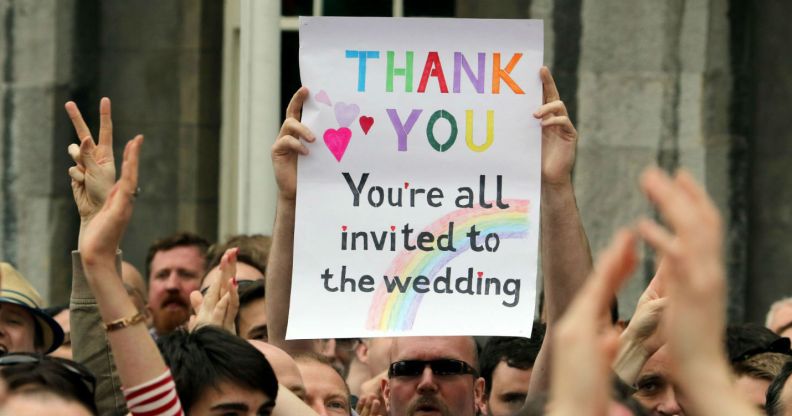Equal marriage has had a surprising effect on the Republic of Ireland’s young people

New research has shown that the introduction in the Republic of Ireland last year has had an effect on those not yet old enough to marry.
A study by LGBT youth organisation BeLonG To has shown that there has been “an enormous surge” in the number of young queer people feeling able to come out.

In May 2015, the Irish public overwhelmingly voted to bring in equal marriage – with 62% of voters backing equality, and just 38% against despite strong lobbying from the Catholic Church in the country.
Weddings began in Ireland in November – and six months on, the country’s Department of Social Protection released figures for the first weddings, revealing that 412 couples had tied the knot so far.
Despite same-sex marriage enabling many to come out who had not done so before, the research also highlights that there is still some way to go to tackle bullying and discrimination.
BeLonG To’s survey asked 1,300 14-23 year olds how the referendum which eventually led to same-sex marriage being introduced in the Republic of Ireland had affected their lives.
39 percent of respondents who identify as LGBT said they had come out for the first time since the referendum, with 49 percent saying they felt the Yes vote had given them extra confidence.
Despite this, 56 percent still said they thought homophobic, biphobic and transphobic bullying had continued at the same rates as before the referendum, and 55 percent said they felt daily life hadn’t changed.
A lack of help and support available to young LGBT people was also highlighted, as 62 percent said they were unaware of where to turn after coming out, and 62 percent also said they had heard negative comments about LGBT people during the ‘No’ campaign.
More than a third, 35 percent, said they thought the vote for same-sex marriage had helped LGBT adults, but that the positive change had not affected them.
Minister for Children and Youth Affairs, Katherine Zappone, is widely recognised with kicking off the debate for equal marriage in Ireland, as she took a case to the High Court to have her marriage to her wife recognised.
She told the Irish Independent: “We would have hoped the passing of the referendum would ultimately be a great beacon of hope for young people. It’s great to see some evidence that that is, in fact, actually what’s happening.”
Adding: “It helped parents and grandparents to provide more support and talk and about it with ease. I can’t say how many parents who have come up to me in the last year to tell me how much of a difference it’s made in their children’s lives.”
She remains optimistic that the Yes vote for equality at the referedum will continue to have a positive effect into the future, despite obstacles remaining for the LGBT community.
“Achieving equality is not just a change of law. Law can provide a foundation to change our ways. It doesn’t bring the magic wand effect right away. It’s important to acknowledge that the referendum was a huge shift for society but, as research shows, that shift is only the beginning,” she continued.
“I hope that in growing up to be great human beings they can take on the challenges of their generation for social change and equality and by way of paying back or remembering and expressing their own gratitude for what they have had in their lives, they can take up the torch for the next big issue that only they can see.”
Moninne Griffith, Executive Director of BeLonG To said young people were “broadly unaffected” by the referendum: “History was made when the Irish people said yes to marriage equality a year ago. But there is more work to do to achieve the Ireland we voted for last May.”
“We know from the young people we work with every day, that sadly their daily lives are broadly unaffected by the referendum. They are still experiencing bullying, isolation, mental health issues and are struggling without the right support,” she added.

